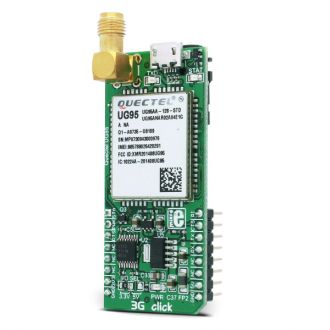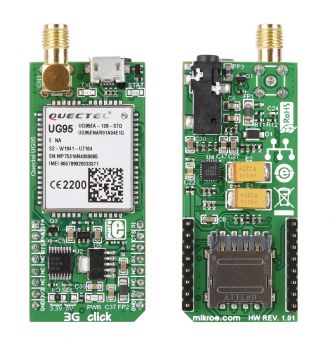
We strongly encourage users to use Package manager for sharing their code on Libstock website, because it boosts your efficiency and leaves the end user with no room for error. [more info]

Rating:
Author: MIKROE
Last Updated: 2018-01-21
Package Version: 1.0.0.1
mikroSDK Library: 1.0.0.0
Category: GSM/LTE
Downloaded: 8898 times
Not followed.
License: MIT license
3G click (for Europe and Australia) is a mikroBUS add-on board with Quectel’s UG95 3G UMTS/HSPA module. The board has an SMA connector, earphone/microphone jack, MicroUSB port, as well as a SIM card slot. 3G click communicates with the target MCU through the mikroBUS UART interface (RX, TX). Note: Antenna sold separately.
Do you want to subscribe in order to receive notifications regarding "3G click" changes.
Do you want to unsubscribe in order to stop receiving notifications regarding "3G click" changes.
Do you want to report abuse regarding "3G click".


Library Description
The library carries generic command parser adopted for AT command based modules. Generic parser.
Key functions:
Examples Description
Example demo application waits for the call. After the call is received the parser will get a hangup call.
This code snippet shows how generic parser should be properly initialized.
Before initialization, the module must be turned on and in additional to this, the hardware
flow control should also be turned on.
void applicationInit()
{
// MODULE POWER ON
c3g_hfcEnable( true );
c3g_modulePower( true );
// MODULE INIT
c3g_cmdSingle( "AT" );
c3g_cmdSingle( "ATE0" );
c3g_cmdSingle( "AT+IFC=2,2" );
c3g_cmdSingle( "AT+CMGF=1" );
}
Along with the demo application, timer initialization functions are provided. Note that timer is configured according to the default development system and MCUs, changing the system or MCU may require an update of timer init and timer ISR functions.
Other mikroE Libraries used in the example:
Additional notes and information
Depending on the development board you are using, you may need USB UART click, USB UART 2 click or RS232 click to connect to your PC, for development systems with no UART to USB interface available on the board. The terminal available in all MikroElektronika compilers, or any other terminal application of your choice, can be used to read the message.